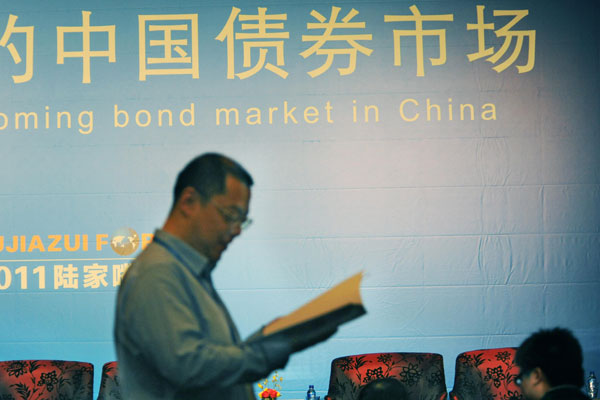Central Bank Vows to Streamline Oversight of Bond Market

Market analysts and investors have long called for a more unified regulatory framework to oversee China’s $11 trillion onshore bond market because divided supervision has allowed violations to grow in the cracks. Now the People’s Bank of China is vowing to streamline regulation and tackle other problems in the world’s third-largest bond market.
In a rare move, the People’s Bank of China highlighted bond-market reform in its top annual policy-setting meeting that concluded on Tuesday in Beijing.
The central bank pledged to establish unified rules for corporate-bond issuance and requirements for information disclosure this year.
The bond market is the most fragmented segment of China’s financial markets. Five regulatory agencies govern bond issuances based on the issuers and where the bonds are traded.
For instance, the National Development and Reform Commission oversees bond issuance by state-owned enterprises while the China Securities Regulatory Commission (CSRC) retains approval authority over bond offerings of non-state firms. Meanwhile, the central bank supervises the issuance of financing bills and other debt instruments.
The central bank’s pledge to focus on bond-market reforms follows top financial regulators in early January issuing the first unified rules on bond trading, targeting widespread violations in bond-repurchase agreements.
The central bank also pledged to improve the mechanism to deal with bond-defaults, which are expected to rise amid continued efforts to deleverage the economy. And it said it would push ahead on “two-way opening up” of the domestic bond market so that Chinese and foreigners can increasingly invest in each other’s markets.
Last July, a bond-connect program was launched to allow overseas investors to buy local debt in the Chinese mainland via Hong Kong. The program is similar to the stock-connect programs linking the Hong Kong bourse with Shenzhen and Shanghai. But the bond-connect program so far is only one-way. Domestic investors can currently buy overseas bonds through the Qualified Domestic Institutional Investor (QDII) under certain quotas.
Official data show that total foreign flows into China’s bond market reached 42.9 billion yuan ($6.8 billion) in December, compared to 38.7 billion yuan in June before the launch of the bond connect program.
In 2017, foreign fund flows into China’s bond market totaled 346 billion yuan, according to the central bank.
The central bank also set priorities this year to step up regulation of internet finance and continue efforts to tame financial risks, promote foreign-exchange reforms, ensure the stability of the yuan, and introduce financial measures to boost the home-rental market.
Contact reporter Han Wei (weihan@caixin.com)

- 1Cover Story: China Carves Out a Narrow Path for Offshore Asset Tokenization
- 2Drownings Shake Chinese Enthusiasm for Travel to Russia
- 3Over Half of China’s Provinces Cut Revenue Targets
- 4Li Ka-Shing’s Port Empire Hit by Forced Takeover Amid Panama Legal Dispute
- 5In Depth: China’s Mutual Fund Industry Faces Overhaul After a Banner 2025
- 1Power To The People: Pintec Serves A Booming Consumer Class
- 2Largest hotel group in Europe accepts UnionPay
- 3UnionPay mobile QuickPass debuts in Hong Kong
- 4UnionPay International launches premium catering privilege U Dining Collection
- 5UnionPay International’s U Plan has covered over 1600 stores overseas






